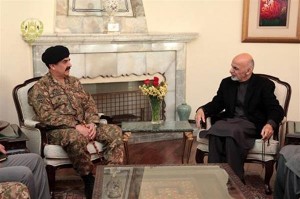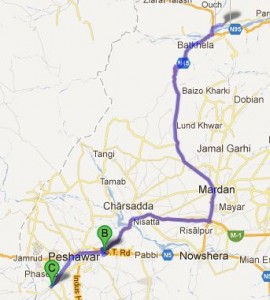Broad Response By Pakistan to Peshawar School Attack

Pakistan’s army chief General Raheel Sharif meeting with Afghanistan’s President Ashraf Ghani on December 17 to discuss cooperation in fighting terror. (ISPR photo)
The deadly attack by Pakistan’s Taliban, the TTP, against a school in Peshawar on Tuesday has prompted a huge and sweeping response in Pakistan and beyond. Perhaps most significantly, Pakistan’s army chief, General Raheel Sharif, went to Kabul the very next day:
General Raheel Sharif, Chief of Army staff today visited Afghanistan and held separate meetings with Afghan President Ashraf Ghani and General John F Campbell, ISAF commander. Matters related to security situation along Pak-Afghan border region came under discussion. Vital elements of intelligence were shared with concerned authorities, with regard to Peshawar incident. Afghan President assured General Raheel Sharif that Afghan soil will not be allowed for terrorists activities against Pakistan and any signature found in this regard will be immediately eliminated.
COAS also assured Afghan President full support to the Unity government in all spheres including joint efforts against terrorists.
ISAF commander also assured of its complete support in eliminating terrorist in his area of responsibility.
Pakistan and Afghanistan have long been at odds about Taliban factions within each country using it as a haven from which to attack the other. ToloNews reports on the potential for the Peshawar attack to change this relationship:
Following his visit, General Sharif said that the Afghan president and ISAF commander assured him that the Taliban would not be allowed to use Afghan soil as a launching pad for attacks on Pakistan, exposing the simmering distrust that remains between the sides after 13 years of war. The general’s comments come after Afghan and NATO coalition leaders have for years pleaded with the Pakistani government to do more to keep the Taliban from using the tribal belt as a safe haven for recruiting fighters and launching attacks into Afghanistan.
But after the Tuesday’s deadly attack by Tehrik-e-Taliban Pakistan (TTP) on a military-run school in Peshawar, it is possible the Pakistani armed forces and civilian government in Islamabad are more inclined to crack down on terrorism and seek help in doing so than ever before. A number of security analysts have encouraged that view, arguing that Afghanistan and Pakistan should come together and establish a joint counter-terrorism task force.
Other steps that Pakistan has taken have been swift. Military courts for trial of terrorism suspects are being established and Pakistan’s moratorium on the death penalty for terrorism offenses has been lifted. Six executions are expected within the next 24 hours. In choosing to move forward with military courts, I guess Pakistan is overlooking the horrible track record in the US for military commissions at Guantanamo when compared to trying terror suspects in criminal court.
Pakistan’s military action against terrorists launched in June, Zarb-e-Azb, is being expanded, with attacks now taking place outside the tribal areas. But it is not just Pakistan’s military that is expanding its activity outside the tribal area. A drone strike today took place right on the Afghan border with Pakistan, just outside Khyber Pakhtunkhwa province. US drone strikes in Pakistan have been almost exclusively in the tribal region, so an attack right on the border of another province is rare. Dawn reports that the attack targeted those believed to be responsible for the Peshawar attack: Read more →

